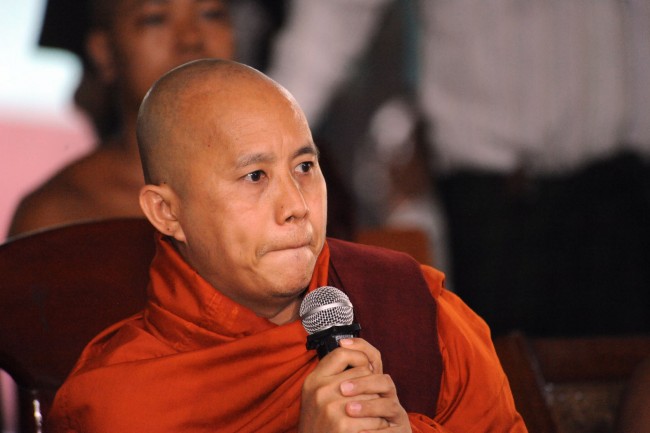A website has been launched dedicated to controversial Mandalay monk Wirathu and his hardline Buddhist monk group, Ma-Ba-Tha.
The site, which is so far available only in Burmese language, promotes the principles of Buddhism and shares information about Buddhist charities and retreats; however its main content has so far been the republishing of news reports and opinion pieces that side with the recent Race Protection laws or which criticise Muslims or any group, including Aung San Suu Kyi’s National League for Democracy (NLD), which appear to take a pro-Muslim stance.
As Burma’s election nears, mainstream political parties such as the NLD and the ruling Union Solidarity and Development Party have been careful not to distance themselves from the outspoken monk and his followers, such is their influence over Buddhist voters.
A speech this week by President Thein Sein warned parties and citizens to maintain harmony and act responsibly during the campaign period, which begins next week, and he specifically urged politicians to “take great care to not cause damage to social harmony or harm our diverse religious beliefs”.
However, no one at this stage is discounting the firebrand monk’s ability to incite crowds with his divisive religious rhetoric.

Nobody is quite sure whether Wirathu gave himself the “Buddhist bin Laden” moniker, or whether it was his opponents, as he claims. But the notorious Burmese Buddhist monk has become a key figure in the muddled political landscape that is the upcoming Burmese elections- successfully stoking the fires of devastating religious and ethnic tensions between pro-nationalist Buddhists and the Muslim minority. Wirathu is regarded as the figurehead of the 969 Movement, a faction that gave rise to the Organisation for Protection of Race and Religion, known by its Burmese anagram Ma-Ba-Tha, a group whose political clout has only increased in recent months in the lead-up to the November election.
A young Wirathu left school in Mandalay at 14 to begin his religious training, but he was relatively unknown until his imprisonment in 2003 for his part in inciting racial violence. The baby-faced monk had led a nationalist campaign to boycott Muslim businesses, and was a central figure in circulating a story that two Muslim brothers raped a young Buddhist maid. The maid later confessed to the fabrication- but the damage was done, two Muslims were killed and a mob raged throughout Mandalay.
Originally jailed for 25 years for inciting religious hatred and other crimes, Wirathu was released alongside hundreds of other political prisoners by Thein Sein in 2012. The timing was fortuitous – the new government had relaxed censorship and access to social media opened up, giving Wirathu an unrestricted platform to target his audience. The charismatic monk began posting his sermons and anti-Muslim sentiment to thousands of subscribers, and maintains his channel with recent talks on the “Jihad and the future of Burma”.
Wirathu and his supporters maintain that he’s a proponent of peace and kindness, and that he and his fellow Ma-Ba-Tha members are only working to safeguard their people from the threat of Muslim violence and creeping dominance.
But the peace-loving image has been a hard sell to the international community. Wirathu famously referred to UN envoy Yanghee Lee as a “whore” and a “bitch”, a statement that he refused to retract in the face of outraged criticism, instead telling DVB in January that was “delightfully proud”. He maintains descriptions of Muslims as “mad dogs”, inflaming resentment amongst nationalists that support his view that Rohingyas are merely Bengalis encroaching on their lands and jobs.
[related]
Ma-Ba-Tha is a relatively new presence, formed in 2013, but they have made their influence over Naypyidaw clear. The Sangha-based group proposed the widely condemned package of laws, the ‘Race and Religion Protection Laws’, a set of legislature that sought to limit interfaith marriage, religious conversion, reproductive rights, and regulate monogamy in households. The laws were commonly seen as a deliberate attempt to limit the autonomy of the Muslim minority and curtail the rights of women.
The Interfaith Marriage law, which requires Buddhist women to seek approval to marry a Muslim man, has been accused to of hindering the independence of women to choose their own husbands. The Population Control Healthcare Law instructs women to wait 36 months between pregnancies. But despite damnation by human rights groups and foreign governments, the president signed into law all four of the bills. Wirathu has famously advertised himself as a protector and advocate for vulnerable Buddhist women, yet it seems the laws came from the complaints of the monkhood rather than women themselves.
In the lead up to the election where countless Rohingyas are barred from the vote and the majority of Muslim applicants have been rejected from the candidacy list, the lack of equality is poised to cast a shadow over the democratic process. The government’s adoption of the laws, as well their silence in light of the monk’s more provocative statements, signals the outspoken Wirathu and Ma-Ba-Tha supporters have both the tacit support of the government and a direct line to lawmakers in Naypyidaw.



